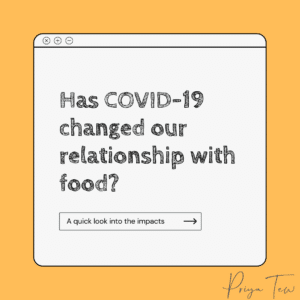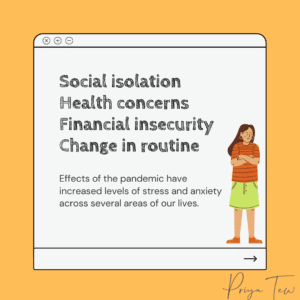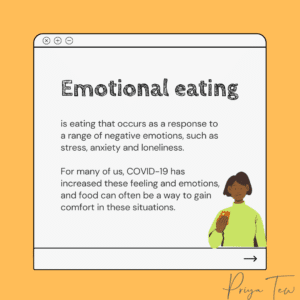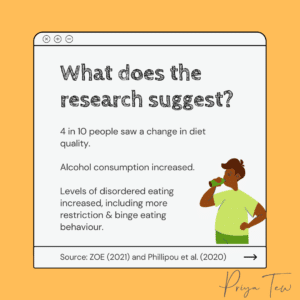The pandemic has changed so many aspects of our lives, from the way we socialise to the way we work, but what impact has it had on the way we eat?

Most of us have experienced additional stress in our lives as a result of adjusting to the ‘new normal’, particularly as a result of (but not limited to) social isolation, health concerns, financial insecurity and change in routine. This additional stress and change in lifestyle can impact our eating habits and the food available to us. It may also mean that to cope with the emotional impact of these stressors, we use a variety of coping mechanisms which can often include emotional eating.

Emotional eating is eating that occurs as a response to a range of negative emotions, such as stress, anxiety, and loneliness, all of which we may have experienced throughout the pandemic. For some this can be a one-off occurrence, however for others it may lead to regular, recurrent binge episodes of eating large quantities of food in a short period of time. Food can often be something we turn to in order to gain comfort in situations, it may spark moments of joy or create nostalgia. However, when we have feelings of guilt or disgust after the consumption of food in emotional situations, or feel out of control during these episodes, it can reinforce a cycle of negative emotions, potentially leading to further restriction and binge eating.

These strained feelings around food may have been new to some throughout the pandemic, however those with existing eating disorders or disordered relationships with food may have experienced additional pressure or more severe changes in behaviour as a result of the impact of COVID-19.
Research by ZOE1,2 into the effects of COVID-19 and the way we eat discovered that two-thirds of the UK population experienced some level of disruption to their diet and lifestyle. This saw 4 in 10 people experiencing a change in their diet quality, as well as more people increasing their alcohol consumption compared to decreasing it. There were some positive changes however, with slightly increased consumption of fruit and vegetables and opportunities to get more active at home.

If we look at a recent study3 investigating changes in eating and exercise behaviours in Australia, in those with existing eating disorders as well as the general population, we can see that the pandemic disruption increased levels of disordered eating behaviours. The general population saw increased restricting and binge eating behaviour, whilst the group with existing eating disorders experienced additional levels of purging and exercise behaviours. This highlights the importance for providing greater monitoring and support for eating disorder patients during this time, as well as further resources and support for the general population that may have found their relationship with food to be negatively impacted.
This time has been difficult for us all and you are not alone in feeling change and overwhelming emotions. Practice compassion and always speak to someone you trust if it is something that is having an impact on your life. There are lots of resources on the BEAT website if you need further support, or you can speak to your GP or a registered dietitian for further guidance on anything you may be struggling with.
Huge thanks to Olivia Booker for this post.
References:
1. ZOE (2021) Has COVID changed the way we eat?
2. ZOE (2021) Life under lockdown: Diet and health behaviours during COVID-19
3. Phillipou et al. (2020) Eating and exercise behaviours in eating disorders and the general population during the COVID‐19 pandemic in Australia: Initial results from the COLLATE project